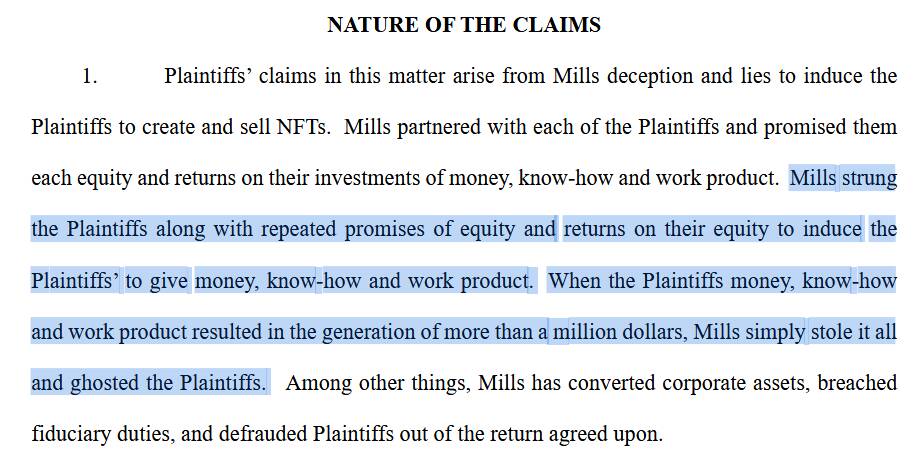In a shocking turn of events in the world of non-fungible tokens (NFTs), investors from the Hashling NFT project have filed a lawsuit against the project’s founder, Jonathan Mills. The plaintiffs claim that Mills misappropriated vast sums of money—allegedly millions of dollars—from both the NFT initiative and an associated Bitcoin mining operation. This legal battle, unfolding in an Illinois district court, brings to light allegations of fraud and breach of fiduciary duty related to the handling of investors’ funds.
The May 14 court filing details that Mills supposedly misled his business partners about the transfer of assets between Hashling NFT and a holding company he controls, initially known as Proof of Work Labs but recently rebranded to Satoshi Labs LLC. According to the plaintiffs, they had collectively raised $1.46 million from two NFT launches on the Solana and Bitcoin blockchains, yet they report not receiving any promised returns from their investments. As stated by the plaintiffs, Mills had even devised a flawed shareholder agreement which allegedly misrepresented the ownership and equity stakes in the venture.
“Mills created a flawed shareholder agreement to falsely support his claim that the holding company controlled the project’s assets,” the plaintiffs claim.
The narrative surrounding Hashling NFT illustrates the complexities and risks involved in the rapidly evolving NFT space. Originally conceived through conversations between Mills and one of the investors, Dustin Steerman, the project brought together multiple partners despite Mills lacking experience and funds. Allegations suggest that following initial enthusiasm and collaboration, Mills began to distance himself from the other investors, complicating the situation further.
As the lawsuit progresses, the plaintiffs are seeking not only legal restitution but also a constructive trust over the project’s assets. With the NFT market continuing to draw interest and investment, cases like these underscore the necessity for transparency and accountability in this burgeoning industry.
Hashling NFT Investors Accuse Founder of Misappropriation
The recent allegations against Jonathan Mills, the founder of the Hashling NFT project, highlight significant issues within the NFT and cryptocurrency space. Here are the key points from this unfolding story:
- Accusations of Fraud: Investors have accused Mills of misappropriating millions of dollars in profits from both the Hashling NFT project and a related Bitcoin mining operation.
- Legal Action: A court filing reveals that plaintiffs have sued Mills for fraud and breach of fiduciary duty after claiming they did not receive the promised equity returns.
- Funds Raised: The investors collectively raised $1.46 million from two NFT drops on the Solana and Bitcoin blockchains, yet they report no returns on their investment.
- Misleading Agreements: Mills allegedly created a flawed shareholder agreement to falsely assert that a holding company controlled the project’s assets, which was said to contain numerous errors.
- Equity Disparity: Mills reportedly held a significant equity (67%) and voting stake in the holding company while other investors had only 2%, leading to major power imbalances.
- Lack of Experience: Mills was allegedly not knowledgeable about NFTs when starting the project, raising concerns about his qualifications and intentions.
- Investor Collaboration: The project began with a collaborative spirit, where Mills and investor Dustin Steerman initially developed the concept together, attracting further supporters.
- Request for Restitution: The plaintiffs are not only seeking damages but are also requesting legal restitution and a constructive trust over the project’s assets.
The unfolding drama of Hashling NFT serves as a cautionary tale about the risks involved in investing in emerging technologies and startups, particularly in the rapidly evolving NFT sphere.
These issues may resonate with investors in the NFT space and other digital assets as they highlight the importance of due diligence, transparent agreements, and the potential for fraud in unregulated markets.
Hashling NFT Scandal: A Deep Dive into Investor Allegations
In a shocking turn of events, the Hashling NFT project has plunged into turmoil as several investors have accused its founder, Jonathan Mills, of significant misappropriation of funds. Allegations include the fraudulent misdirection of over $3 million and a breach of fiduciary duty, raising a critical eye on the governance vying within the NFT landscape.
Comparing this case to recent controversies in the cryptocurrency and NFT arena, like the notorious failure of prominent projects such as Bitconnect, reveals striking parallels. Both situations involve founders whose mismanagement or deceit have led to devastating financial losses for investors. In the Hashling case, the critical advantage lies in the community approach that the plaintiffs initially had—the collaboration and promise of shared success drew investors in, a familiar tactic that has both its merits and pitfalls. Conversely, the situation is fraught with challenges, including the flawed shareholder agreements that seemingly benefitted Mills to an overwhelming degree, relegating others to mere 2% stakes while he maintained a commanding 67% control.
This unfolding drama showcases a significant competitive disadvantage for NFT projects as it casts a shadow on trust in the marketplace. The manner in which Mills allegedly circumvented transparency with a “ghosting” strategy highlights a burgeoning issue where anonymity and a lack of oversight expose investors to risk. Furthermore, the unique structure of equity stakes, where the split appears alarmingly uneven, pressures many investors in similar projects to scrutinize the equity distributions they hold, which may result in decreased investor confidence industry-wide.
Victims of this controversy are likely to be those who have invested heavily based on the allure of projected returns and the community-centric model often touted by NFT ventures. Families and individual investors who placed their trust in promising ventures may find their interests seriously compromised, leading to financial strain. In contrast, this situation could serve as a wake-up call for potential investors to perform due diligence and reassess their strategies in the ever-evolving NFT domain. As the dust settles, it could potentially steer some projects towards more transparent governance models, fostering a healthier ecosystem.
As news of these allegations ripples through the NFT community, it could catalyze existing NFT projects to initiate reforms. Yet, it raises questions on potential investors’ willingness to enter a space shadowed by such risks or pull back entirely, causing a potential downturn in an already volatile market.

















